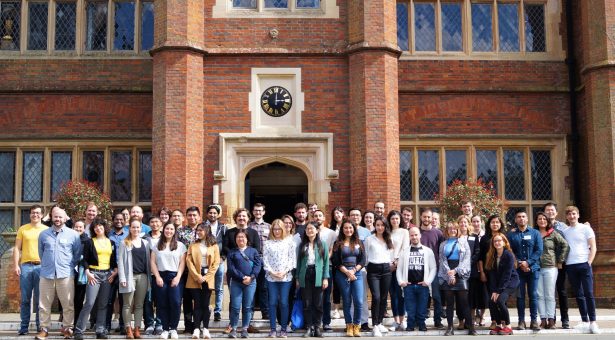Building bridges across Europe – a Tripartite Early Career Researcher Conference in Norwich

In May this year, scientists from the UK, Germany and Spain gathered in Norwich for the second CRAG-JIC-MPIPZ early career researcher (ECR) conference.
After two very long years without conferences, in person meetings, and very reduced travel due to the COVID pandemic, everyone was excited for what would be, for many, their first in-person conference.
We caught up with conference organisers PhD student, Anna Backhaus and Post-Doc Researcher, Estee Tee to find out more about the event. Over to Anna and Estee.
“The conference started on a sunny morning, and we heard about the importance of different starch compositions in the cereals from John Innes Centre Group Leader, Dr David Seung, while pondering our breakfast choices.
David’s talk provided an exciting taste of good things to come over the next two days. The programme was full of exciting talks, spanning a wide field of subjects: from futuristic phenotyping at the John Innes Centre, to thinking about plant microbe interactions and unique seed dispersal mechanisms.
There were many underlying themes; from the power of novel and creative imaging techniques, understanding pathogen resistance at the genetic and cellular level, biotic and abiotic interactions of plant shoots and roots, the complexities of transcriptional regulation, and the importance of how our research translates to crops – be it the staples of wheat, rice, or brassicas, to fruits such as tomato, apple, melon and peach.
Everyone was blown away by the diversity of the topics and the complexity, the elegance, and the novelty of the research, and all of this in just 48 hours.
Scientific meetings like this are an important part of research. Because what good is science if no one knows about it? Long past are the days of the lone, hermit scientists who, for example huddled away in the pea gardens of monasteries and islands of Greece, to work solemnly on their research question.
Today, we share our science to advance as fast as possible, as a community not as an individual. The methods available to the sciences have undergone an unprecedented diversification over the last century. Thus, we rely on collaborations to harness the power of all the available techniques, without having to achieve the impossible and be an expert in each.
This ECR conference was a great example of how sharing ongoing research between three major biological science institutes from across Europe, can help to further diversify and gain insight into other techniques that might be readily available at one institute but not another.
The wide range of research projects and collaborations between the three institutes also encouraged participants to leave their comfort zone of familiar questions and topics, and face a huge variety of research across a wide range of plants; from wheat to melons, to the mighty cardamine, aka bitter cress and more.
Not only did everyone get the opportunity to network between the institutes, as part of this year’s conference the international delegates had the opportunity to visit the facilities at the John Innes Centre. These tours showcased the laboratories, the field station, and the platforms available and promoted their work and technology.
This exchange of research at a conference like this is also an important part of the lifecycle of a scientist.
Conferences greatly help to form professional networks and spark future research projects. The CRAG-JIC-MPIPZ ECR Conference is specifically aimed at early career scientists (late-stage PhD students and post-docs) to facilitate their next career steps.
At larger conferences ECRs can easily be overshadowed by more senior scientists, as there are only limited spots for presentations and competing for these can be very challenging.
This conference gave more than 50 young scientists the opportunity to present in person and showcase their work.
It can be difficult to navigate a career in science and the journey can feel overwhelming at times. Meeting with so many fantastic researchers at a similar career stage was another benefit of the conference. Being able to have informal chats about the same fears and worries can bring more peace to one’s mind than 10 hours of meditation.
As part of the conference, a group leader from each of the three institutes was invited to the conference and this year Dr Tonni Grube Andersen from MPIPZ and Dr Nicolas Bologna from CRAG kindly accepted our invitations.
Over dinner, they, alongside some young John Innes Centre group leaders, shared openly their adventures and mishaps in forging out their own career paths. This was another fantastic opportunity to gain insight into the complex pathways of the academic research career forest and highlighted how persistence and confidence in one’s own research is half of the battle.
For the whole conference, you could feel an atmosphere of joy and excitement. This was of course due to the outstanding presentations and science shared, but equally due to the truly fantastic personalities attending. We are grateful for all the enthusiasm that everyone brought, for the curiosity and openness, and for the general love of science.
Thank you to all who attended, and for those who helped throughout the journey. We’re excited to see you next in Cologne in 2024.”
